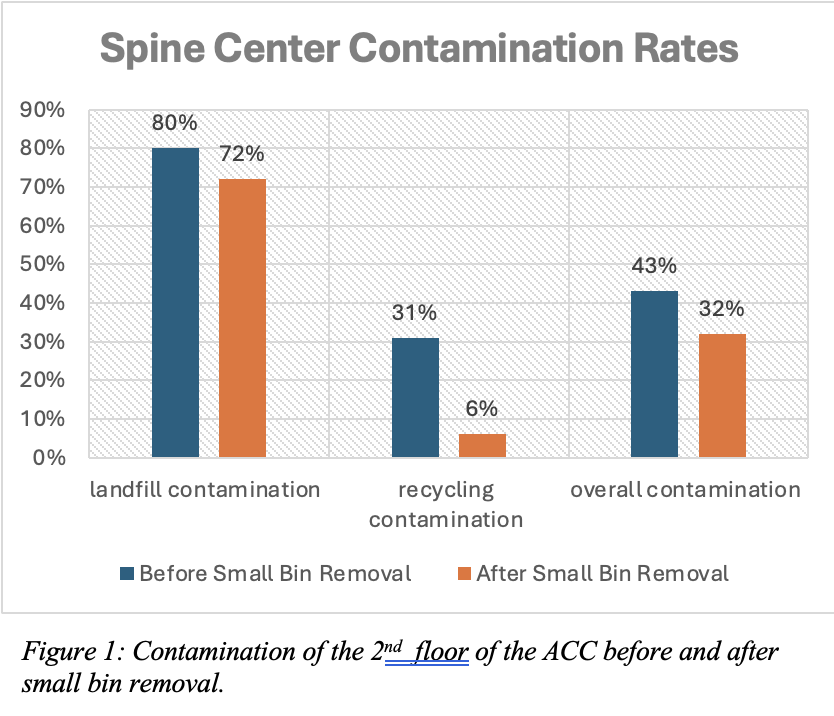Transitioning from individual waste to central waste stations has been shown to reduce contamination rates which has positive impacts on the environment. Individual waste bins are damaging because they use a new single-use bin liner every day. These liners are made by extracting fossil fuels which accelerates the effects of climate change. With that, individual bins also get contaminated with materials that could be recycled and given a new life or with compostables that could create nutrient-rich compost to help feed our communities. The use of individual waste bins has been a contributing factor to UCSF Health having contamination rates above the allowed limit set by Recology, causing UCSF Health Parnassus Heights to be fined up to $7,000 a month. Aside from the financial burden, improper sorting of waste, such as compost, creates methane gases that get trapped within the atmosphere and contribute to climate change. While individual waste bins are convenient, they harm the environment and the communities UCSF Health cares about.
Dan Henroid, the director of UCSF Health Sustainability and Nutrition and Food Services (NFS), saw this problem as an opportunity to reimagine the way we think about waste. In 2019, he transitioned the NFS office from having upwards of 10 individual waste bins to one central waste station in the office. This was the first office to transition to this type of waste collection. This centralized waste station had recycling, landfill, and compost receptacles accompanied by signage to help indicate which materials belonged in what bin. We can look to the Nutrition and Food Services Office at the Parnassus Heights location and recognize their success in implementing these changes. As of September 10, 2024, we conducted a pulse audit which showed the overall contamination rate in the NFS office to be 6%, this is well below the threshold.
To understand how individuals in the office felt about the change we sent out a survey in early 2023, where they gauged the impacts of centralized waste stations. While initially there was trepidation about taking away the individual waste bins, it soon became routine and individuals reported they enjoyed getting up from their desks to throw away their waste. Along with that, people feel more inclined to sort their waste to ensure that it is going to the correct place.
Here are some sentiments from the employees:
“I wanted to help make a difference here in my work area to help reduce waste that contributes to global warming and pollution to the planet.”
“It also creates less clutter in the office and makes waste removal more efficient and concentrated in one area. It keeps things cleaner overall.”

From the NFS office, we were able to observe the qualitative benefits of centralized waste stations and this inspired the UCSF Health Sustainability team to implement a pilot project to gain quantitative data. The Spine Center in the Ambulatory Care Clinic is where this project was implemented. Originally the Spine Center had a baseline contamination rate of 43% when there were individual waste bins. This decreased to 32% after the individual waste bins were removed, illustrating the efficacy of their replacement with centralized waste stations. These success stories illustrate the efficacy of the proposed model that we hope to implement in all office suites throughout UCSF Health.
While removing personal waste bins can appear as an inconvenience, it is proven to decrease overall waste contamination and increase individual participation in sustainable practices. From this, we can see that individual waste bins promote wasteful practices as proper sorting doesn’t take place and requires more bin liners.
If you have any questions or would like to learn more about the sustainability programs, and centralized waste stations email the team at healthsustainability@ucsf.edu.